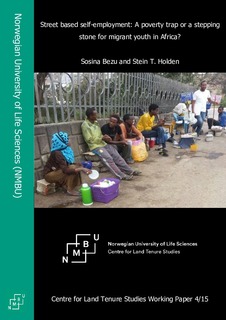Resource information
A significant percentage of youth in urban Africa is employed in the informal sector. The
informal sector is more accessible than the formal sector for people with low human and
financial capital, such as youth migrants from rural areas. But the sector is also generally
considered to provide a subsistence livelihood. This study examines whether street based selfemployment in Africa offer a stepping stone towards a better livelihood or an urban poverty trap for youth migrants. The analysis is based on data from a survey of 445 street vendors in two urban areas in Ethiopia. We found that street based self-employment is indeed dominated by migrant youth; 96% of those engaged in the street based self-employment are youth and 98% are migrants from rural areas or smaller towns. Our analysis suggests that street based selfemployment can offer a viable transitional employment for migrant youth. We found that the average monthly earning of these self-employed youth is better than the minimum wage in the public sector and much higher than the official poverty line. We found that most of the youth consider this as a transitional employment and accumulate skill and capital with a view to establishing their own enterprise or accessing skilled employment. Young women are less likely than young men to seek exit out of street based self-employment but education increases their aspiration. Youth with better-off parents back home and those with larger network in their new residence are more likely to change their current occupation. The main risk for the livelihood of youth in this type of employment is lack of legal recognition to their activities and work place, which manifest itself in the form of arbitrary eviction and displacement from their work place.


